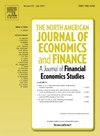ESG rating and default risk: Evidence from China
IF 3.8
3区 经济学
Q1 BUSINESS, FINANCE
North American Journal of Economics and Finance
Pub Date : 2024-11-15
DOI:10.1016/j.najef.2024.102314
引用次数: 0
Abstract
Based on the data of Chinese A-share listed companies from 2009 to 2022, this study constructs a bivariate panel vector autoregression (PVAR) model to examine the dynamic equilibrium relationship between default risk and environmental, social, and governance (ESG) performance and its individual dimensions. Results indicate that ESG performance and corporate stability exhibit growth inertia and self-reinforcing mechanisms, with overall ESG performance significantly mitigating default risk. Although no bidirectional causality was found between environmental and governance performance and default risk, corporate stability positively impacts both over time. The findings indicate a synergistic relationship between social performance and default risk, in which strong social performance helps mitigate default risk. Financial stability encourages companies to engage in social responsibility initiatives. Heterogeneity analysis demonstrates that the mitigating effects of ESG performance on default risk are more pronounced for non-state-owned enterprises (non-SOEs) and small- and medium-sized enterprises (SMEs). Social responsibility and corporate governance are more significant in enhancing financial stability in manufacturing firms. These findings provide valuable insights for investors and policymakers in mitigating default risks while promoting the development of green finance.
ESG评级与违约风险:来自中国的证据
本研究基于2009-2022年中国A股上市公司数据,构建双变量面板向量自回归(PVAR)模型,检验违约风险与环境、社会和治理(ESG)绩效及其各维度之间的动态均衡关系。结果表明,环境、社会和治理绩效与企业稳定性之间呈现出增长惯性和自我强化机制,环境、社会和治理的整体绩效显著降低了违约风险。虽然在环境和治理绩效与违约风险之间没有发现双向因果关系,但随着时间的推移,公司稳定性对两者都有积极影响。研究结果表明,社会绩效与违约风险之间存在协同关系,即强有力的社会绩效有助于降低违约风险。财务稳定性鼓励公司参与社会责任倡议。异质性分析表明,环境、社会和治理绩效对违约风险的缓解作用在非国有企业和中小型企业中更为明显。社会责任和公司治理对提高制造业企业的财务稳定性更有意义。这些发现为投资者和政策制定者在促进绿色金融发展的同时降低违约风险提供了有价值的见解。
本文章由计算机程序翻译,如有差异,请以英文原文为准。
求助全文
约1分钟内获得全文
求助全文
来源期刊
CiteScore
7.30
自引率
8.30%
发文量
168
期刊介绍:
The focus of the North-American Journal of Economics and Finance is on the economics of integration of goods, services, financial markets, at both regional and global levels with the role of economic policy in that process playing an important role. Both theoretical and empirical papers are welcome. Empirical and policy-related papers that rely on data and the experiences of countries outside North America are also welcome. Papers should offer concrete lessons about the ongoing process of globalization, or policy implications about how governments, domestic or international institutions, can improve the coordination of their activities. Empirical analysis should be capable of replication. Authors of accepted papers will be encouraged to supply data and computer programs.

 求助内容:
求助内容: 应助结果提醒方式:
应助结果提醒方式:


